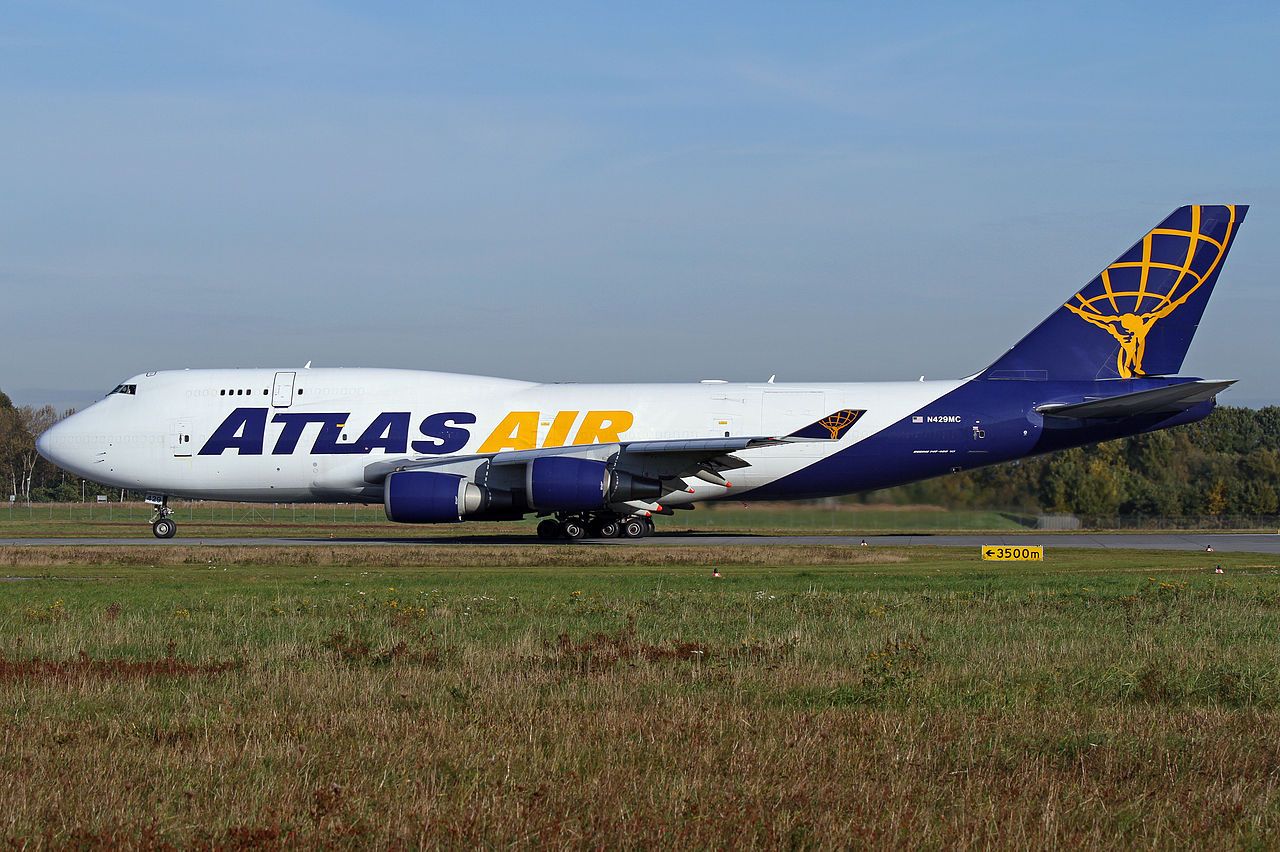Atlas Air Worldwide Holdings, Inc. today announced second-quarter 2020 net income of $78.9 million, or $3.01 per diluted share, compared with net income of $86.9 million, or $1.61 per diluted share, in the second quarter of 2019.
On an adjusted basis, EBITDA totaled $247.0 million in the second quarter this year compared with $84.1 million in the second quarter of 2019. Adjusted net income in the second quarter of 2020 totaled $123.2 million, or $4.71 per diluted share, compared with $4.5 million, or $0.17 per diluted share, in the second quarter of 2019.
“Revenue and earnings in the second quarter continued to exceed our expectations,” said Chief Executive Officer John W. Dietrich. “These positive results were primarily driven by the team capitalizing on strong demand and higher yields in our commercial charter and South America businesses. We also continued to provide the U.S. military with essential services and our ACMI customers flew well above their minimum guarantees.
“We continued to execute on very favorable business opportunities in a challenging operating environment, with the safety of our employees as our top priority. We leveraged the scale of our world-class fleet, the scope of our global operations and the flexibility of our business model to capitalize on market dynamics.
“To serve this increased demand, we reactivated three of our 747-400 converted freighters and operationalized a 777 freighter from our Dry Leasing business. This enabled us to serve the strong and profitable shorter-term demand, while also entering into numerous new long-term charter programs at attractive yields. We expanded our long-term charter business to include new agreements with manufacturers such as HP Inc., and large freight forwarders like DHL Global Forwarding, APEX Logistics, DB Schenker, Flexport and Geodis, all that wanted to secure committed capacity from us.”
Mr. Dietrich added: “We continued to deliver safe and high-quality service for our customers, despite the many challenges presented by this pandemic, including a variety of travel restrictions, testing protocols, quarantine mandates and other operational challenges. This is a true testament to the commitment and dedication of all our Atlas team members, particularly our crew and ground staff out in the field.
“We are taking every precaution to safeguard all our employees and ensure that we continue to transport the goods the world needs during these important times. We also appreciate our customers’ and vendors’ commitment to safety, and their partnership and unity as we protect our employees and our operations.”
He said: “Atlas is continuing to play an essential role in the global supply chain, and the goods we carry help save lives, fuel economic activity and support jobs. We are playing a key role in our customers’ operating networks, and are helping businesses and communities manage through COVID-19.
“With our broad portfolio of aircraft, including the world’s largest fleet of 747 freighters, along with large fleets of 777s, 767s and 737s, we provide our customers with fleet choices and operating capabilities that are unmatched in our industry.
“We have a talented team, a strong balance sheet, and we continue to demonstrate our ability to adjust to market conditions, capitalize on strategic growth opportunities, and navigate through these evolving and uncertain times.
“Reflecting our first-half results and our current market expectations, and subject to any material COVID-19 developments, we anticipate full-year 2020 revenue of just over $3 billion and adjusted EBITDA of approximately $750 million.*
“Our outlook also expects approximately 50% of our full-year 2020 adjusted net income to occur in the second half of the year. That would result in 2020 adjusted net income being more than double 2019.”
Second-Quarter Results
Volumes in the second quarter of 2020 increased to 84,966 block hours compared with 80,282 in the second quarter of 2019, with revenue rising to $825.3 million compared with $663.9 million in the prior-year quarter.
ACMI segment revenue during the period reflected lower block hours, primarily driven by the redeployment of 747-400 aircraft to the Charter segment to support new long-term charter programs with customers seeking to secure committed cargo capacity. This was partially offset by an increase in 777, 737 and 747-400 CMI flying.
ACMI segment contribution decreased during the quarter primarily due to higher heavy maintenance, including additional engine overhauls and other maintenance performed to take advantage of slot availability and opportunities for vendor pricing discounts. In addition, segment contribution reflected higher pilot costs related to a 10% increase in pay rates resulting from our recent interim agreement with our pilots and premium pay for pilots operating in certain areas outside of the U.S. significantly impacted by COVID-19; and the redeployment of 747-400 aircraft to the Charter segment to support new long-term charter programs with customers seeking to secure committed cargo capacity. Partially offsetting these items was an increase in 777, 737 and 747-400 CMI flying, and a reduction in aircraft rent and depreciation.
Charter segment revenue during the period primarily reflected increased levels of flying and an increase in the average rate per block hour. Block-hour volume growth was primarily driven by increased demand for freighter aircraft, reflecting a combination of increased demand for cargo, as well as the reduction of available cargo capacity in the market, the disruption of global supply chains due to the pandemic and our ability to increase utilization. As a result of this increase in demand and in support of new long-term charter programs with customers seeking to secure committed cargo capacity, we redeployed 747-400 aircraft from ACMI and began operating a 777 from our Dry Leasing business. The increase in the average rate per block hour primarily reflected higher commercial cargo yields (excluding fuel), partially offset by lower levels of 747 passenger flying for the U.S. military.
Charter segment contribution was driven by the increase in commercial cargo yields (excluding fuel), and demand for freighter aircraft, reflecting a combination of increased demand for cargo, as well as the reduction of available capacity in the market, the disruption of the global supply chain due to the pandemic and our ability to increase utilization. In addition, segment contribution benefited from a reduction in aircraft rent and depreciation, and the redeployment of 747-400 aircraft from ACMI and a 777 freighter from Dry Leasing. These improvements were partially offset by: higher heavy maintenance expense, including additional engine overhauls and other maintenance performed to take advantage of slot availability and opportunities for vendor pricing discounts; lower U.S. military passenger flying as the pandemic disrupted the movement of U.S. military personnel; and higher pilot costs related to a 10% increase in pay rates resulting from our recent interim agreement with our pilots and premium pay for pilots operating in certain areas outside of the U.S. significantly impacted by COVID-19.
In Dry Leasing, lower segment revenue and contribution in the second quarter of 2020 primarily related to changes in leases and the disposition of certain nonessential Dry Leased aircraft during the first quarter of 2020.
Lower unallocated income and expenses, net, during the quarter primarily reflected a $24.3 million (after tax) refund of aircraft rent paid in previous years.
Reported earnings in the second quarter of 2020 also included an effective income tax rate of 29.5%, due mainly to nondeductible changes in the value of outstanding warrants. On an adjusted basis, our results reflected an effective income tax rate of 21.6%.
Cash and Short-Term Investments
At June 30, 2020, our cash and cash equivalents, restricted cash and short-term investments totaled $739.2 million, compared with $114.3 million at December 31, 2019.
Our improved cash balance primarily reflected strong cash provided by operating activities, and also included the funds we received through the Payroll Support Program available to air cargo carriers under the CARES Act. Those funds will be utilized to pay the salaries, wages and benefits of employees, and helps us to protect the jobs of our highly-skilled team during this period of global uncertainty.
Net cash provided by financing activities during the first six months of 2020 primarily related to proceeds from debt issuance and from our revolving credit facility, partially offset by payments on debt obligations.
Net cash used for investing activities during the first six months of 2020 primarily related to capital expenditures and payments for flight equipment and modifications, including spare engines and GEnx engine performance upgrade kits, partially offset by proceeds from the disposal of aircraft.
To mitigate the impact of any continuation or worsening of the pandemic, we have implemented a number of cost-reduction initiatives, including a significant reduction in nonessential employee travel, the use of contractors and ground staff hiring. We have also taken actions to increase liquidity and strengthen our financial position, such as the sale of certain nonessential assets and our participation in the Payroll Support Program under the CARES Act.
Half-Year Results
Reported results for the six months ended June 30, 2020 reflected net income of $102.3 million, or $3.92 per diluted share, which included a $29.7 million unrealized loss on financial instruments. Results for the first half compared with net income of $57.2 million, or $2.21 per diluted share, which included an unrealized loss on financial instruments of $4.3 million, for the six months ended June 30, 2019.
On an adjusted basis, EBITDA totaled $368.2 million in the first half of 2020 compared with $204.5 million in the first half of 2019. First-half 2020 adjusted net income totaled $153.1 million, or $5.87 per diluted share, compared with $31.8 million, or $1.16 per diluted share, in the first half of 2019.
2020 Outlook*
Reflecting our first-half results and our current market expectations for the balance of the year, and subject to any material COVID-19 developments, we expect to fly more than 330,000 block hours in 2020, with about 70% of the hours in ACMI and the remainder in Charter.
We also anticipate revenue of just over $3 billion and adjusted EBITDA of approximately $750 million. Our outlook also expects approximately 50% of our full-year 2020 adjusted net income to occur in the second half of the year. That would result in 2020 adjusted net income being more than double 2019.
Historically, we have generated the vast majority of our earnings in the second half of the year. This year, however, due to the strength of the first half, we anticipate our full-year 2020 adjusted net income to be more evenly split between the first and second half. Our second-quarter results this year benefited from commercial charter yields that were significantly above typical levels and from a $24.3 million (after tax) refund of excess aircraft rent paid in previous years.
Aircraft maintenance expense in 2020 is expected to total about $480 million, with depreciation and amortization totaling around $255 million. Core capital expenditures, which exclude aircraft and engine purchases, are projected to total approximately $80 to $90 million, mainly for parts and components for our fleet.
We estimate our full-year 2020 adjusted effective income tax rate will be approximately 23%.
For the third quarter of 2020, we expect commercial charter yields to moderate from the second quarter, but still remain elevated compared with typical yields for this time of year. We anticipate flying more than 85,000 block hours (about 70% in ACMI), with revenue of nearly $800 million and adjusted EBITDA of about $170 million. We also expect that our third-quarter adjusted net income will represent approximately 20% of our full-year 2020 adjusted net income, or to be more than six times higher than third-quarter 2019 adjusted net income of $9.5 million.
We provide guidance on an adjusted basis because we are unable to predict, with reasonable certainty, the effects of outstanding warrants and other items that could be material to our reported results.*
Follow and connect with us on Facebook, Twitter, LinkedIn, Instagram and Google News for the latest travel news and updates!
Read Also – Air Serbia And Turkish Airlines To Begin Codeshare Flights Between Belgrade And Istanbul





